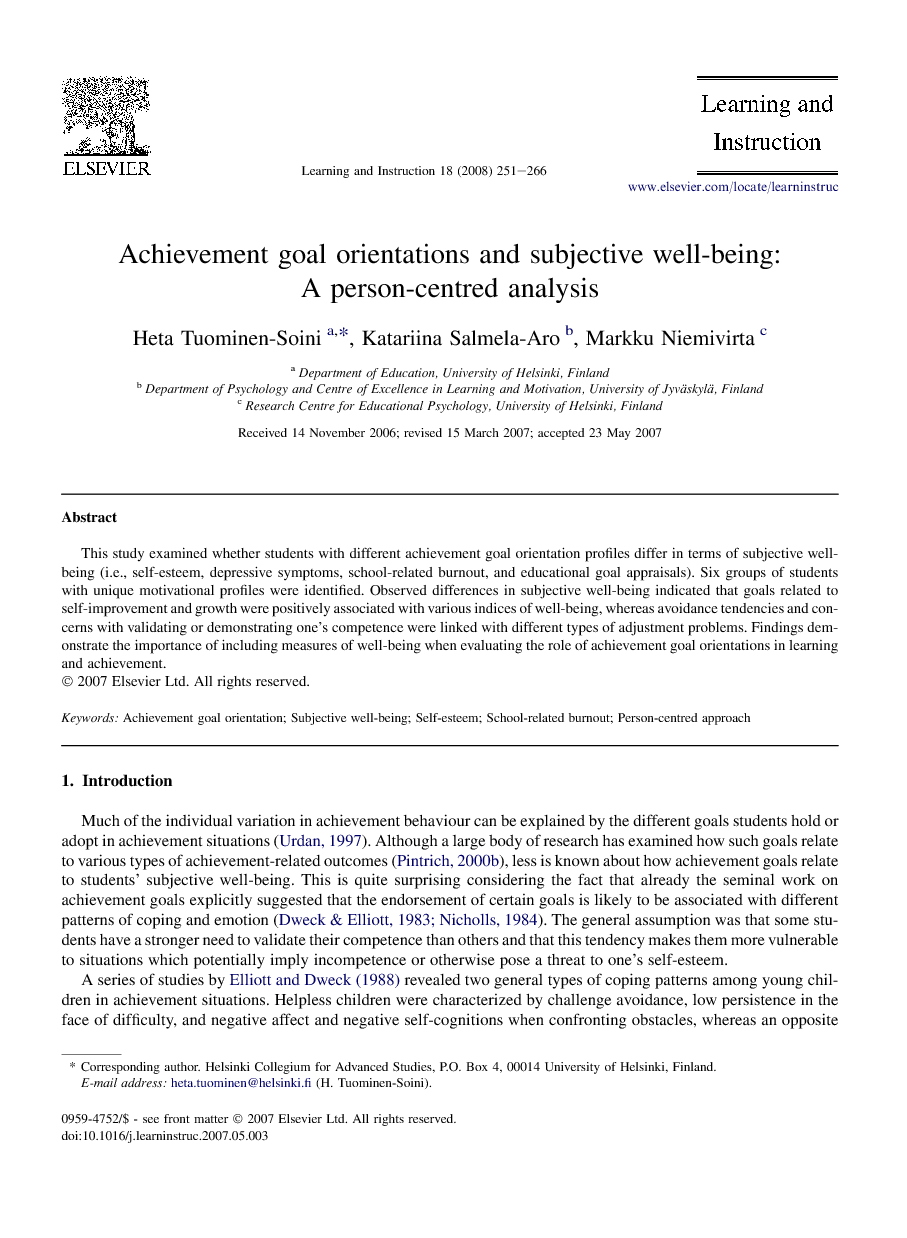This study examined whether students with different achievement goal orientation profiles differ in terms of subjective well-being (i.e., self-esteem, depressive symptoms, school-related burnout, and educational goal appraisals). Six groups of students with unique motivational profiles were identified. Observed differences in subjective well-being indicated that goals related to self-improvement and growth were positively associated with various indices of well-being, whereas avoidance tendencies and concerns with validating or demonstrating one's competence were linked with different types of adjustment problems. Findings demonstrate the importance of including measures of well-being when evaluating the role of achievement goal orientations in learning and achievement.
Much of the individual variation in achievement behaviour can be explained by the different goals students hold or adopt in achievement situations (Urdan, 1997). Although a large body of research has examined how such goals relate to various types of achievement-related outcomes (Pintrich, 2000b), less is known about how achievement goals relate to students' subjective well-being. This is quite surprising considering the fact that already the seminal work on achievement goals explicitly suggested that the endorsement of certain goals is likely to be associated with different patterns of coping and emotion (Dweck and Elliott, 1983 and Nicholls, 1984). The general assumption was that some students have a stronger need to validate their competence than others and that this tendency makes them more vulnerable to situations which potentially imply incompetence or otherwise pose a threat to one's self-esteem.
A series of studies by Elliott and Dweck (1988) revealed two general types of coping patterns among young children in achievement situations. Helpless children were characterized by challenge avoidance, low persistence in the face of difficulty, and negative affect and negative self-cognitions when confronting obstacles, whereas an opposite pattern characterized mastery-oriented children. Consistent with the assumptions, helpless children were more driven by performance goals (i.e., wanting to demonstrate competence) whereas mastery-oriented children were striving for learning goals (i.e., wanting to gain competence). Kaplan and Maehr (1999) extended this work by looking at the role achievement goals may play in facilitating the well-being of young students. They found that the pursuit of mastery goals was positively associated with general indices of well-being, such as emotional tone, peer relationship, and impulse control, and with school-related affect. In contrast, pursuing performance goals was negatively related to emotional tone and impulse control, and with affect at school. Kaplan and Maehr (1999) concluded that achievement goals are linked with emotions and cognitions that not only contribute to effective learning but also relate to well-being more generally. This view was also confirmed by Roeser, Strobel, and Quihuis (2002), who found further support for the above scheme in a more general context, linking goals and motivational tendencies to general socio-emotional functioning. Their results showed that, compared to mastery-oriented students, helpless students had lower self-esteem and higher levels of anger and sadness, and they were less engaged and reported more withdrawal behaviour in school. Similarly, based on Dweck's work, Dykman (1998) proposed a goal-orientation model for explaining and predicting depression. The model predicted that compared to growth-seeking (i.e., mastery-oriented) people, validation-seeking (i.e., performance-focused) people would show greater anxiety in anticipation of a stressful event and greater self-esteem loss, task disengagement, and depression after a negative event. Again, support for these predictions was found in several studies (see also Sideridis, 2005).
Together, these studies suggest that individuals' subjective well-being is associated with the kinds of goals and outcomes they seek to attain. More specifically, it appears that goals related to self-improvement and growth are related to better socio-emotional functioning and more positive self-evaluations, whereas the tendency to validate and demonstrate one's personal qualities is more linked with adjustment problems and socio-emotional vulnerability. In this study, we extended this prior work by focusing on a broader set of achievement goal orientations, employing a person-centred approach to the study of individual differences (see Niemivirta, 2002a and Roeser et al., 2002), and including additional domain-specific indices of well-being that are directly linked with school and education.
Following Boekaerts and Niemivirta (2000), we assumed that students' motivational tendencies influence the way they appraise school-related events. Whether the focus is on increasing resources (e.g., gaining knowledge, learning new skills) or maintaining emotional well-being (e.g., trying to not fail or look incompetent) depends on how the events are appraised and how these appraisals relate to the person's available resources (see Boekaerts, 1993). The personal relevance or importance of any event is evaluated in relation to the person's goals and the possible implications of the outcomes of the event. This view suggests that individuals' tendencies to select certain goals or favour certain outcomes (i.e., their achievement goal orientations) create an interpretative framework for evaluating not only current but also anticipated future events. More specifically, we assumed that students' appraisals of the properties of and progress with their future educational goals vary as a function of their achievement goal orientation profiles and that these differences parallel differences in other related indices of general and school-related well-being.


